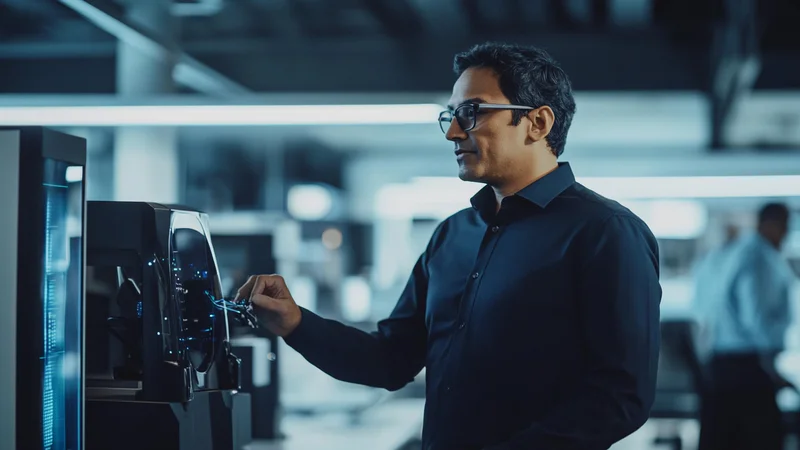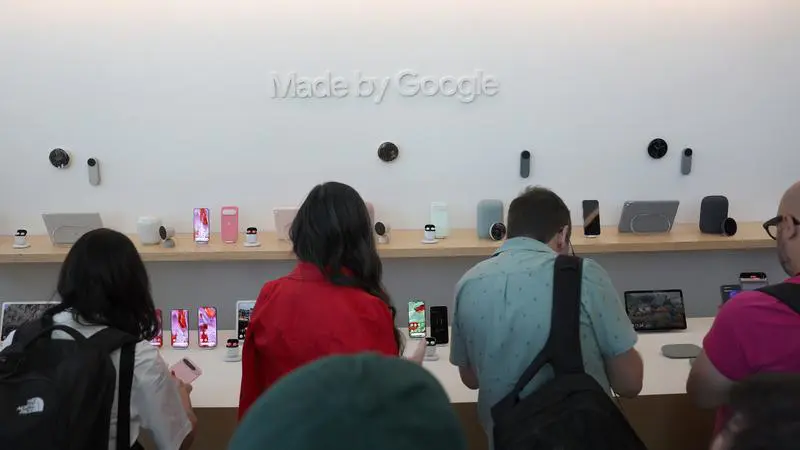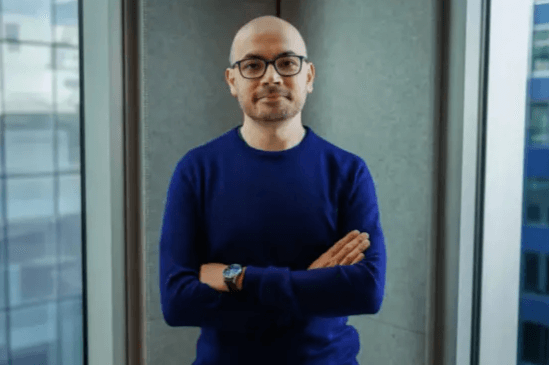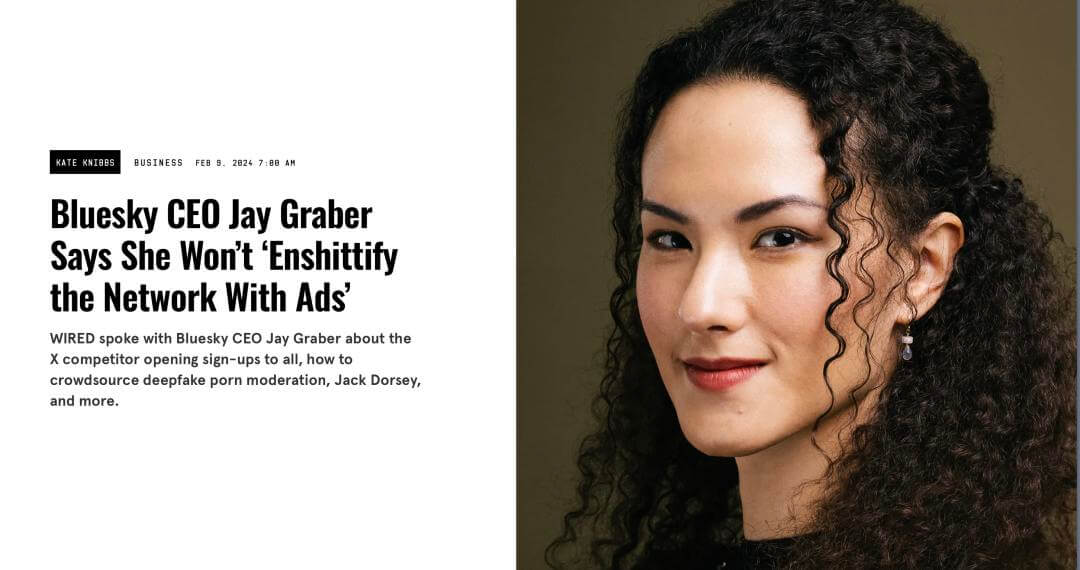A well-established AI company, a star of the past, has collapsed in the era of large models. The bankruptcy of this veteran AI company seems to mark the first heavy note in the symphony of generational transition.
"Pioneer in General Large Model Applications," ChatGPT, has been online for two years.
Many people's and companies' lives have changed because of it, but for Afiniti, the impact might have been the most drastic. So much so that the last time they publicly mentioned ChatGPT was in their bankruptcy filing.
In September of this year, Afiniti filed for liquidation and winding-up with the Supreme Court of Bermuda under the Companies Act. In their bankruptcy filing, they mentioned that the release of ChatGPT caused clients' interest in artificial intelligence to "almost overnight" shift to generative AI. "Main clients shifted their AI budgets to generative AI for customer service, rather than Afiniti's AI for optimizing results prediction in call centers."
Afiniti is undeniably a representative of the old guard in AI companies. Back in 2017, when AlphaGo achieved 60 wins, no losses, and a draw, sweeping top Go players from China, Japan, and South Korea, Afiniti had already secured four rounds of funding and reached a valuation of $1.8 billion. That year, nearly all tech media were reporting that Afiniti was very likely to become the first AI software company in the U.S. to go public.
However, this prosperous period was short-lived. After its Series E funding in 2019, Afiniti saw no more progress toward an IPO. Today, the rise of generative AI (GenAI) seems to have had an irreversible negative impact on the company, leaving it a company burdened with $518 million in debt. In an era where AGI is drawing closer, large models are emerging one after another, and AI entrepreneurship is becoming more common and low-barrier, the bankruptcy of this old AI company feels like the first heavy note in the symphony of generational change.
Once a Star Company
As a veteran AI star company, Afiniti had almost all the factors we can imagine for a startup's success.
First, the founder, Pakistani entrepreneur Zia Chishti, had successful entrepreneurial experience and was also an investor with a background from Stanford's Graduate School of Business. Before founding Afiniti, Zia Chishti invented the globally popular orthodontic product "Invisalign," becoming a millionaire in 1997.
In 2006, Zia Chishti founded Afiniti in Washington, D.C., with the goal of solving problems using AI that had vast market potential. Essentially, Afiniti offered a software that used AI to match salespeople with customers to improve their interactions. The algorithm broke away from traditional call distribution methods, which relied on the order of incoming calls. Instead, it referenced over 100 databases to collect caller information, analyze various traits, and predict which pairings would yield the best results for both the caller and the company.
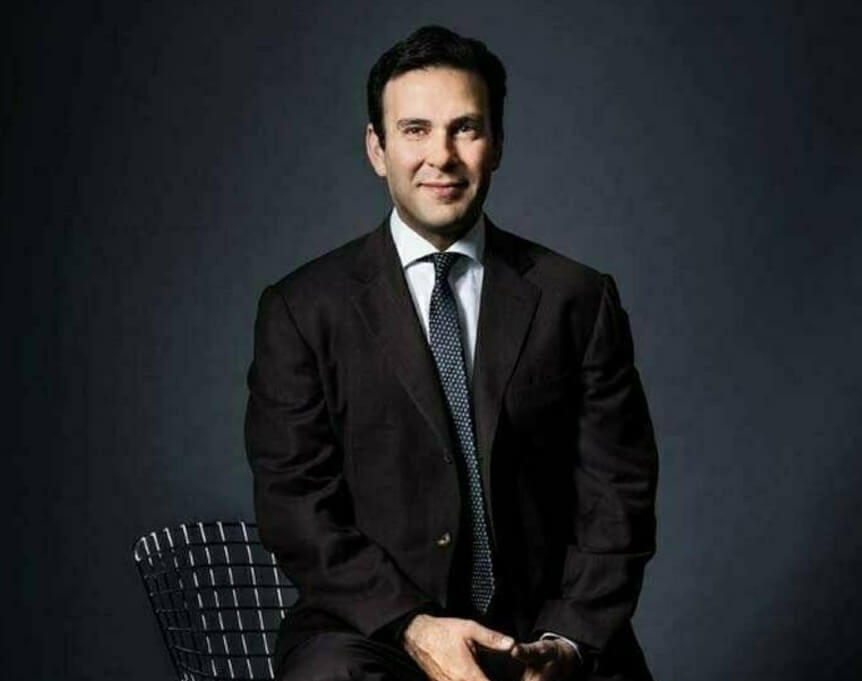
Although the data at the time was far from the iceberg of today's general large models, it was still very broad and diverse. It included information from credit companies like Experian, data companies like Acxiom, Targus, and Allant, social networks like Facebook and LinkedIn, and even census data on the caller's region. Afiniti's system worked like a magical "matchmaker" (also like Tinder for sales and call centers), precisely matching the best-suited representative for the customer based on previous transaction records, and then directly forwarding the call. If the customer had a connection with the assigned representative, the chances of a successful transaction would increase significantly.
In 2008, Afiniti began filing multiple patents related to matching caller data with computer models. With over 90 patents, Afiniti successfully realized Chishti's vision of analyzing data linked to customer identity and business information to identify successful interaction patterns and using these patterns in real-time to improve health outcomes, business profitability, and customer satisfaction.
It’s clear that the key to this model was acquiring high-quality, large industry clients, and Afiniti followed this path. Starting in Washington, Afiniti first secured major North American telecom companies, then expanded into industries such as insurance, financial services, hospitality, and healthcare. In September 2017, Afiniti signed an agreement with Huawei, and in April 2018, it partnered with Avaya. In January 2018, Fortune magazine listed Afiniti among the "100 Companies Leading in Artificial Intelligence." By 2019, the technology had brought billions of dollars in additional revenue to over 250 companies in more than 20 countries, covering large sectors like financial services, insurance, hospitality, and healthcare. Afiniti had grown into a company with 1,000 employees, supporting 1.3 million interactions per day and optimizing pairings.
Notably, Afiniti also conducted business in China, so it’s possible that the person you spoke to when calling your bank was chosen by Afiniti. In late 2020, the U.S. tech market information platform CB Insights listed Afiniti among the eight most capital-favored AI unicorns.
At that time, Afiniti had raised a total of $320 million, with a star-studded lineup of investors including McKinsey & Company, Swiss asset management company GAM, Vista Equity Partners, and high-profile individual investors like Elizabeth Murdoch, former Verizon CEO Ivan Seidenberg, former Reuters CEO Tom Glocer, and former BP CEO John Browne.
Zia Chishti envisioned a grand future for Afiniti: "Although the company’s main application is in call centers, overall, what we are doing is changing the way businesses allocate internal resources and staff when connecting with customers. So it could be anything: text chat, sales representative allocation, in-store employees."
Afiniti claimed significant results, saving clients large amounts of costs or generating additional revenue. However, despite raising Series E funding, Afiniti's overall operations were still in the red.
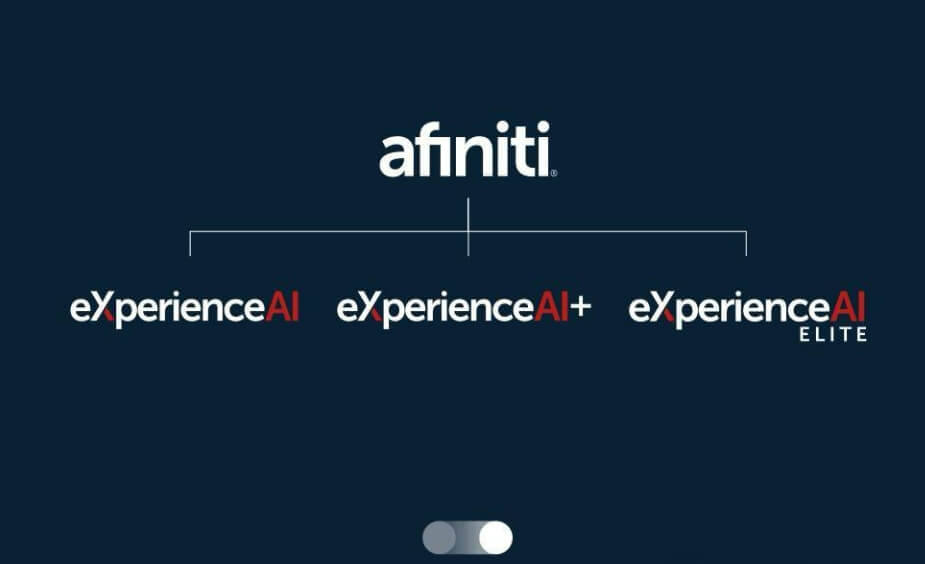
In the previous AI wave, companies like large models had not yet emerged to swallow up funds like beasts, and Afiniti's losses were likely related to its revenue model. Afiniti adopted a "zero investment, pay-for-performance" business model. At the time, no other company in the world was doing what Afiniti did, and they believed that, through this business model, they would become the only company in the world capable of precisely measuring the effectiveness of AI applications.
However, this model was actually very risky. Since revenue was directly tied to the client's additional earnings, Afiniti's income was highly unstable. In the early stages of business development or during unstable market conditions, there could be long periods without income or severe income fluctuations. Once future income became unpredictable, there would be no guarantee of continuous cash flow to support research, development, operations, and expansion.
Moreover, in order to provide services, Afiniti needed to invest in upfront R&D costs, labor costs, and infrastructure construction costs. Without income for long periods while waiting for clients to achieve incremental revenue, this could lead to a break in the cash flow chain.
Had Afiniti gone public during the previous AI boom, it might have been able to ride the wave and avoid the fate of bankruptcy. However, by 2021, "the last straw that broke the camel's back" appeared: an employee testified before the U.S. House Judiciary Committee, accusing Zia Chishti of sexual assault, leading him to resign from his positions as chairman, CEO, and director. This scandal also implicated several prominent figures on the board, including former UK Prime Minister David Cameron, who resigned from his role as chairman of Afiniti’s advisory board. This event dealt a heavy blow to Afiniti, and overnight, it went from being a rising star to a hot potato.
Perhaps there are more stories beneath the surface, but above it, with the shelving of its IPO plan, the founder stepping down due to a sex scandal, a lack of self-sustaining capacity, and the coming onslaught of the new AI wave, Afiniti slid into decline.
The "Hemorrhaging" Continues
Afiniti's bankruptcy filing has caused a stir in the U.S. enterprise services industry, with several prominent leaders and professionals speaking out to participate in the discussion.
Andrew Traba, Vice President of Product Marketing at NICE, quickly criticized Afiniti, calling it a "fake AI company" using "smokescreens." In a LinkedIn post, Traba accused the company of failing to deliver on its promise to drive customer experiences with AI, claiming that it leaned more toward "flashy demos and bold promises" rather than tangible business outcomes.
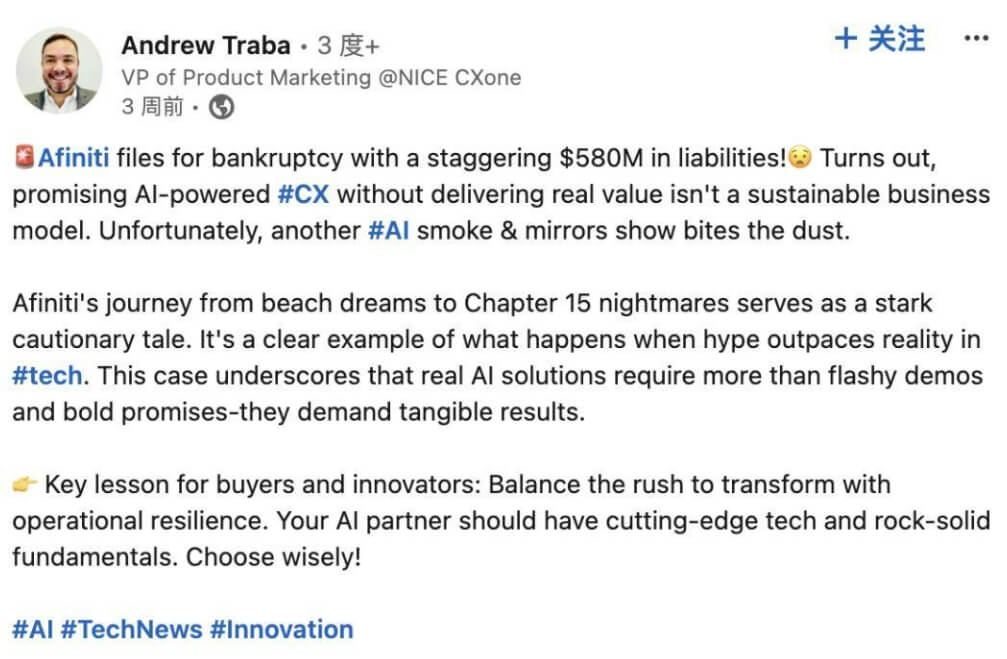
Andrew Traba's Post
Laurent Philonenko, Managing Partner at customer experience consulting firm DeepTech Group, attempted to defend Afiniti, arguing that the rise of GenAI had a negative impact on the company's business.
Traba, however, further rebutted that the emergence of ChatGPT had led companies to increase their overall investment in AI, rather than shifting funds from other types of AI to generative AI.
Looking at real data, Traba's viewpoint clearly holds more weight: a study by Goldman Sachs showed that, in 2016, less than 1% of companies in the Russell 3000 index mentioned AI during their earnings calls. However, since the release of ChatGPT, the frequency of AI mentions in earnings calls has significantly increased, from less than 1% in 2016 to over 16% in 2023. About half of this increase occurred after the release of ChatGPT, indicating that generative AI has sparked broader market attention and investment interest.
The fundamental reason for Afiniti's downfall is that the market no longer favors loss-making growth companies.
Its bankruptcy is not just an isolated event but part of a larger industry adjustment, signaling the gradual decline of some veteran AI companies and the more obvious reshaping of the market landscape by emerging technologies.
With the advent of large models, the market has reached a critical point. Only companies that can quickly adapt to and leverage new AI technologies will emerge as big winners. In contrast, other companies will be eliminated.
Afiniti embodies many of the characteristics of traditional AI companies before the rise of large models.
For example, its application scenarios were relatively narrow and fixed, typically building decision-making/predictive AI solutions on traditional machine learning algorithms and smaller-scale data, focusing more on specific industry applications. Its main large clients were concentrated in traditional industries such as finance, healthcare, and manufacturing.
On the other hand, new AI companies represented by generative AI are centered around large-scale pre-trained models, with a core focus on powerful language understanding and generation capabilities that can quickly adapt to various tasks and domains. These new AI companies can leverage the versatility and flexibility of large models, demonstrating greater innovation and market adaptability, quickly opening up new application scenarios and exploring new business models and service areas.
Furthermore, traditional AI companies have relatively conventional business models, primarily generating revenue through software sales, project customization, and service fees, with more limited funding channels relying mainly on venture capital and bank loans. Due to market competition and the pressure of technological updates, the profitability of traditional companies can be affected.
In the era of large models, old companies may need to invest substantial capital in technology upgrades and transformations, facing significant financial pressures. New AI companies, however, have more diversified and innovative business models. In addition to traditional software sales and service fees, they can generate revenue through data licensing, platform partnerships, subscription services, and other means. In the era of large models, new AI companies represent the future technological trends and market opportunities, quickly attracting large amounts of venture and strategic investments. Without profitable businesses supporting the application of large model technologies in their products and services, and without external empowerment, it is difficult for an old AI company to quickly transform.
Currently, Afiniti has stated that, as part of a restructuring agreement with creditors, it will liquidate its global entities in Bermuda and U.S. courts, to form a new company owned by major creditor Vista Capital Partners.
A Wave of Old AI Companies Falling
It is worth mentioning that Afiniti is not the only old AI company facing a double whammy of debt and the impact of generative AI.
Recently, Forward Health, a high-tech healthcare pod company that raised over $500 million and operated for eight years, also announced its shutdown. The company has yet to provide a detailed explanation for the closure, though speculation suggests that the high costs of renting expensive real estate in cities like New York and San Francisco, combined with the decreasing appeal of their AI-based diagnostic services, may have played a role.
In addition to shutdowns, another aspect of this current timeline is the dramatic shrinking of valuations.
Enterprise-level conversational AI company Amelia was acquired by SoundHound AI for $80 million, a price far below the $175 million funding it received in 2023. Similarly, conversational AI solution provider LivePerson has seen a sharp drop in its valuation. In 2024, its stock price fell below $1, with a market capitalization of less than $80 million, facing delisting risks. In previous years, its market value had reached $6 billion, but with the rise of generative AI technology, its market competitiveness has significantly declined.
As we approach the end of 2024, this massive "hemorrhaging" is still not over. It feels as if any AI technology developed before ChatGPT no longer matters. In 2025, we may witness an even more intense generational shift.
